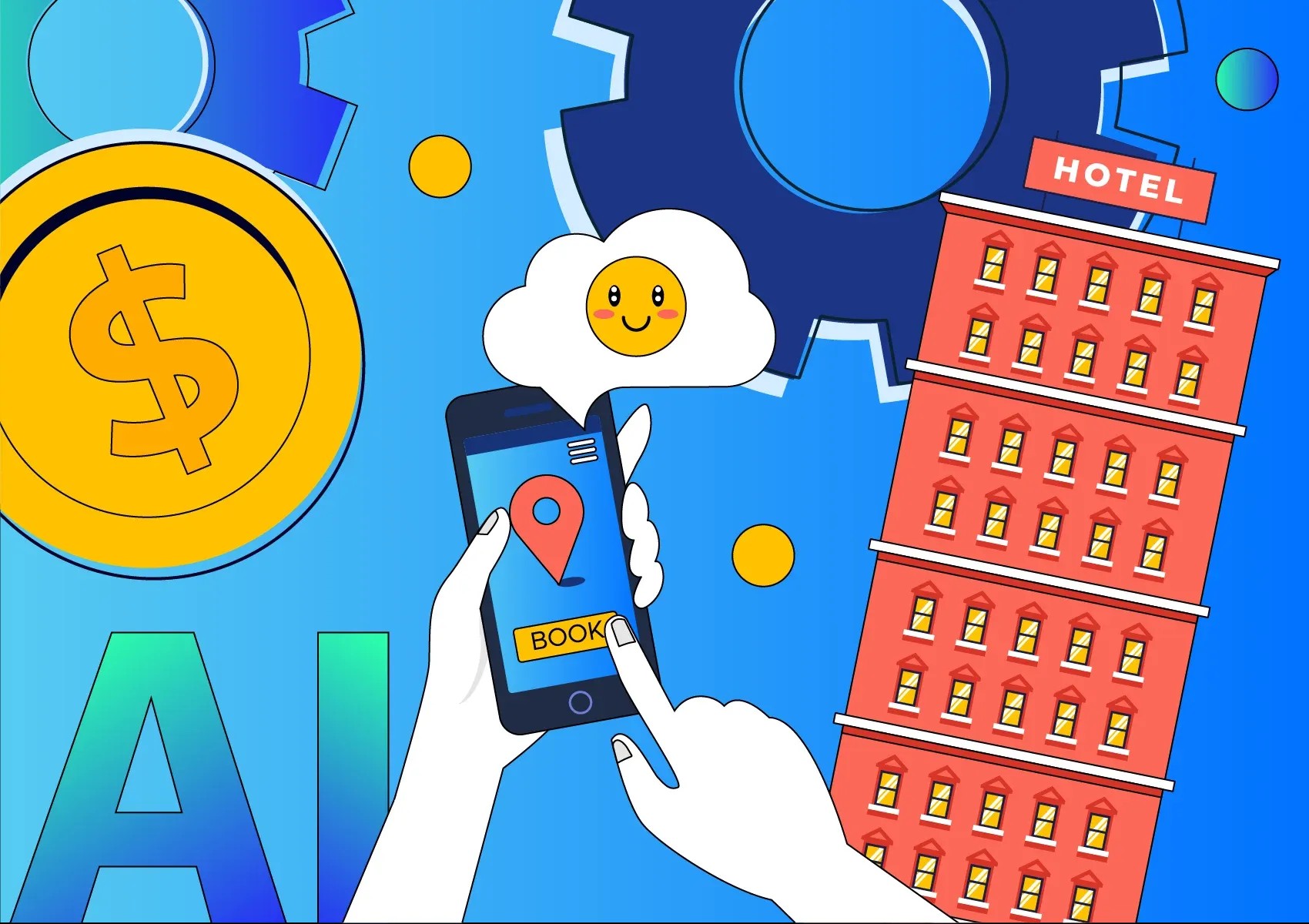
In 2026, AI in the travel industry is no longer a future trend — it’s a must-have for competitive travel businesses.
In a market saturated with OTAs and travel marketplaces, travelers expect instant answers, hyper-personalization, and 24/7 support, making the use of AI in travel industry essential for revenue uplift, cost reduction, customer retention, and operational resilience.
The Business Value of AI Adoption in Travel
Key Applications Highlighting AI's Transformative Impact on the Travel Industry
Onix Expertise in Travel Products Digital Transformation
Ready To Revolutionize The Way Your Travel Business Works?
FAQ
Leveraging AI travel technology and machine learning in travel industry, Onix helps travel companies transform digital operations, automate traveler segmentation, and deliver personalized experiences at scale, turning AI-driven insights into measurable business outcomes.

We help online travel startups grow!
The Business Value of AI Adoption in Travel
By 2026, AI adoption in travel has become a core driver of growth and efficiency.
Recent industry data shows that AI-influenced revenue now accounts for roughly 40–45% of total sales among large travel companies—up sharply from about 21% in 2021 and forecasted increases in prior years. AI-driven analytics and automation are central to this shift.
AI enables faster, more accurate decision-making across pricing, personalization, demand forecasting, and customer service. Travel firms using machine learning deliver more relevant offers and smarter segmentation while reducing operational costs.
Chatbots and AI assistants now handle billions of customer interactions annually, boosting engagement and cutting support costs. For example, airlines and travel platforms report AI-assisted support raising agent productivity by up to 50%, freeing staff to focus on complex tasks.
AI also unlocks new revenue streams: dynamic pricing engines and personalized recommendations enhance conversion and upsell results, with many firms reporting mid-single-digit revenue lifts from these capabilities.
Overall, AI’s combination of predictive insights, automated customer engagement, and scalable analytics is firmly established as a key value driver in travel—accelerating revenue growth, improving service quality, and strengthening competitive advantage.

Learn how we developed areliable travel booking solution for the LGBTQ community!
Key Applications Highlighting AI's Transformative Impact on the Travel Industry
In 2026, AI/ML in the travel industry spans the entire journey — from customer experience to operations and revenue management.
Travel businesses leveraging AI gain a competitive edge through hyper-personalization, automation, and data-driven insights, turning technology into a measurable business impact.
Generative AI for Vacation Planning
Generative AI travel assistants (LLM-based, RAG/knowledge-grounded) help travelers plan trips with accurate, contextual recommendations and day-by-day itineraries. Benefits of an AI travel assistant include instant, personalized guidance and reduced planning friction.
Business outcome: Faster booking decisions, higher conversion, and improved customer satisfaction.

How CharterGPT assists users in finding and booking private charter flights
“The travel industry is unquestionably going to be significantly disrupted by AI. Whether it’s gen AI or other forms of AI that have been around for some time remains to be seen.
It’s quite clear that if you work through the customer journey and the process of trying to understand where you want to go, where you want to stay, what are the things you want to see, how you want to plan your day-by-day itinerary, gen AI significantly eases the process of travel discovery.”
- Vik Krishnan, Partner at McKinsey
Read also our article on machine learning limitations.
Smart Sensing and IoT
Machine learning predicts and optimizes airport and hotel flows, baggage handling, and incident management via IoT sensors. Real-time alerts improve efficiency and reduce operational disruptions.
Business outcome: Operational resilience, cost reduction, and smoother travel experiences.

AI Sensors Enhancing Tourist Experiences
Contextual AI-driven sensors provide on-site personalization — from location-based recommendations to tailored content at museums, attractions, and city tours.
Business outcome: Higher engagement, extended visit durations, and increased ancillary revenue.

Utilizing beacon technology to guide visitors through vast collections in the Louvre Museum in Paris
Digital Concierge Services
Modern AI travel assistants integrate LLMs with PMS, POS, and CRM systems, offering voice/chat support, personalized recommendations, and privacy-compliant interactions.
Business outcome: 24/7 customer support, increased loyalty, and reduced staffing costs.

Virgin Hotels' in-app virtual assistant functions as a contactless mobile key
AI Algorithms For Sustainability
AI predicts and optimizes energy use, flight routes, and travel itineraries to reduce environmental impact while maintaining operational efficiency.
Business outcome: Cost savings, compliance with sustainability goals, and positive brand perception.
AI-Driven Revenue Management
Machine learning enables dynamic pricing, forecasting, and promotion optimization, providing BI dashboards across departments for strategic decisions.
Business outcome: Revenue uplift, optimized occupancy, and data-driven business growth.

Learn how Onix designed and built a booking platform connecting travelers with local businesses in Cyprus
Route Optimization
AI's predictive capabilities play a pivotal role in route optimization, significantly impacting operational efficiency and cost savings.
Swiss's adoption of an AI platform for operations optimization resulted in substantial savings, optimizing over half of the flights and generating $5.4 million in operational cost savings. Lufthansa's use of AI to forecast wind direction at Zurich Airport has enhanced operational reliability, increasing predictability by 40%.

Lufthansa increases on-time flights by wind forecasting with Google Cloud ML
Intelligent Process Automation

Intelligent Process Automation (IPA) has become indispensable for travel companies grappling with staff shortages. IPA automates manual processes, significantly reducing completion times while minimizing errors. Let’s consider some of the most beneficial applications of IPA in travel.
- Automating Booking Processes: IPA can automate reservation and booking procedures for flights, hotels, and other travel services, reducing manual errors, minimizing processing times, and enhancing overall efficiency.
- Expense and Financial Management: IPA systems can automate expense reporting, invoice processing, and financial workflows, ensuring accuracy, reducing processing times, and improving financial compliance.
- Customer Relationship Management (CRM): IPA tools streamline customer interactions, automate responses to queries, manage customer data, and facilitate personalized communication, thereby improving customer service and engagement.
- Compliance and Regulatory Procedures: IPA automates compliance checks, ensuring that travel companies adhere to industry regulations and standards, thus reducing risks and ensuring compliance.
- Supply Chain and Inventory Management: IPA assists in managing inventory, optimizing procurement processes, ensuring efficient supply chain operations, reducing costs, and enhancing inventory control.
- Check-in and Check-out Processes: For hotels and accommodations, IPA can automate check-in and check-out procedures, reducing waiting times, enhancing guest experiences, and improving overall operational efficiency.
- Workflow and Task Automation: IPA can be used to automate routine tasks and workflows, such as data entry, report generation, and administrative processes, freeing up staff to focus on more complex tasks and improving overall productivity.
These applications demonstrate how IPA can be integrated into various facets of the travel industry, transforming manual and time-consuming processes into efficient, automated workflows, ultimately improving operational efficiency and customer satisfaction.
Read also about other ways of automation in travel.
Onix Expertise in Travel Products Digital Transformation
Onix combines deep travel domain expertise, product engineering, and AI/ML capabilities to help travel and hospitality businesses modernize their digital products.
From OTAs and marketplaces to hotel platforms and mobile apps, we deliver solutions that drive revenue, efficiency, and guest engagement, powered by ai in digital travel transformation.
What We Build for Travel and Hospitality
We develop end-to-end platforms for hotels, OTAs, marketplaces, and travel apps. Our solutions cover online booking, itinerary management, payment integration, and loyalty programs — all designed to scale and meet the needs of today’s hyper-competitive travel market.
Business outcome: Streamlined operations, faster go-to-market, and improved customer satisfaction.
AI/ML Capabilities We Implement
Our AI/ML implementations include:
- Personalized recommendations for flights, accommodations, and experiences
- Automated traveler segmentation using machine learning algorithms
- Fraud detection to protect hosts and guests
- Dynamic pricing and revenue optimization
- AI travel assistants for 24/7 support and hyper-personalized interactions
Business outcome: Increased bookings, higher loyalty, operational resilience, and measurable revenue growth.
Case Studies: Misterb&b & TravelBid
- Misterb&b: Developed a secure booking platform tailored for gay travelers in 200+ countries. Integrated AI-based fraud detection, personalized search, and reviews, ensuring safety and convenience.

- TravelBid: Created a travel booking platform connecting travelers with 14,000+ local businesses. Implemented real-time recommendations, dynamic offers, and AI-powered preference matching to enhance booking confidence and engagement.

Business outcome: Both platforms showcase how AI in digital travel transformation drives tangible results — higher conversion, better customer experience, and operational efficiency.
Ready to elevate your travel business with AI-driven solutions? Partner with Onix to transform your digital products and unlock measurable growth.
Ready To Revolutionize The Way Your Travel Business Works?
In 2026, the success of travel and hospitality businesses depends on effectively leveraging AI and digital technologies to drive measurable outcomes — from operational efficiency and personalized experiences to revenue growth and sustainability. Security, privacy, and governance are no longer optional; they are must-haves for any modern travel solution.
Our approach is pragmatic and outcome-driven:
- Roadmap: Assess your travel product, define business goals, and identify AI/ML and digital transformation opportunities.
- Pilot: Launch targeted proof-of-concepts, such as AI travel assistants, dynamic pricing models, or AR/VR experiences, to validate impact.
- Scale: Expand successful initiatives across platforms, integrating secure, compliant, and scalable systems for end-to-end digital travel transformation.
At Onix, we help global travel businesses implement AI, ML, and immersive technologies to transform customer journeys, optimize operations, and unlock new revenue streams. Work with us to pilot your next-generation travel solution and scale innovation with confidence.
FAQ
- How to choose a company for AI and machine learning implementation in travel products?
Look for a partner with travel domain expertise, product engineering, and AI/ML capabilities, proven experience in ai in digital travel transformation, and a track record of delivering measurable outcomes like revenue uplift, cost reduction, and customer retention.
- What are the most valuable AI use cases in the travel industry in 2026?
Top applications include AI travel assistants, personalized recommendations, dynamic pricing, fraud detection, route optimization, and predictive operations. These drive revenue, engagement, and operational efficiency across the travel lifecycle.
- What are the key benefits of AI in the travel industry for revenue, retention, and cost reduction?
AI enables dynamic pricing and revenue management, hyper-personalized customer experiences, 24/7 AI travel assistants, and automated operational workflows. This results in higher bookings, improved loyalty, and reduced operational costs.
- How can an AI travel assistant improve bookings, customer support, and user experience?
AI travel assistants provide instant responses, contextual recommendations, itinerary planning, and support across channels. They increase conversion, reduce human support costs, and enhance satisfaction for travelers.
- What data is needed for machine learning in the travel industry, and how should it be prepared?
Useful data includes booking history, traveler preferences, operational metrics, and transactional records. Data must be cleaned, structured, and enriched to train ML models for accurate recommendations, forecasting, and segmentation.
- In what ways can machine learning optimize or disrupt travel operations?
ML can predict demand, optimize pricing, forecast staffing, manage baggage and check-ins, and improve route planning. It disrupts traditional processes by automating manual tasks and enabling proactive decision-making.
- How can Onix help with AI and machine learning in digital travel transformation?
Onix delivers AI-driven solutions for travel products, including recommendation engines, ML-based segmentation, fraud detection, dynamic pricing, and AI travel assistants. Our expertise in ai in digital travel transformation ensures scalable, secure, and measurable impact across customer experience, operations, and revenue.

Never miss a new blog post from us!
Join us now and get your FREE copy of "Software Development Cost Estimation"!
This pricing guide is created to enhance transparency, empower you to make well-informed decisions, and alleviate any confusion associated with pricing. In this guide, you'll find:
Factors influencing pricing
Pricing by product
Pricing by engagement type
Price list for standard engagements
Customization options and pricing



